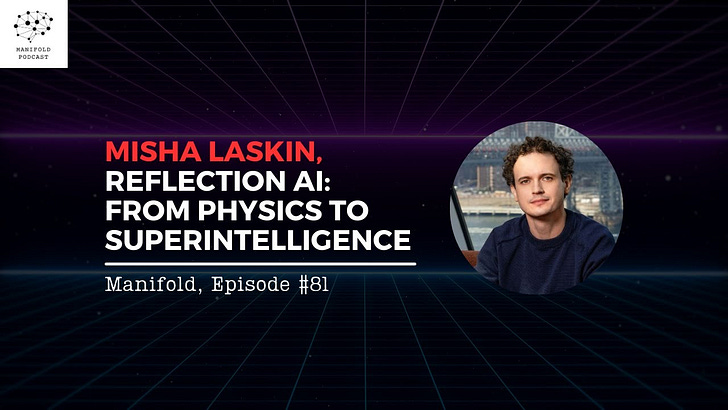Misha Laskin is CEO of Reflection.ai. He was trained in theoretical physics at Yale and Chicago before becoming an AI scientist. He made important contributions in Reinforcement Learning as a researcher at Berkeley, Google DeepMind, and on the Google Gemini project.
https://x.com/MishaLaskin
Steve and Misha discuss:
(00:00) - Introduction
(00:47) - Misha's Early Life and Education
(03:50) - Transition from Physics to AI
(05:47) - First Startup Experience
(07:19) - Discovering Deep Learning
(08:06) - Academic Postdoc at Berkeley
(14:31) - Joining Google DeepMind
(16:36) - Reinforcement Learning and Language Models
(26:42) - Challenges and Future of AI
(48:30) - Unique Perspective from Physics
Audio-only version and transcript:
https://www.manifold1.com/episodes/misha-laskin-reflection-ai-from-physics-to-superintelligence




When you talk about "going beyond" what is known, like in physics, maybe what AI's lack is imagination? The guys who build AI's have imagination (in fact that's the whole secret to their creativity) but the AI's themselves do not?
To give a concrete example, it took imagination for me to come up with this idea: https://shorturl.at/K9ZV3
What started me off was that (for completely unrelated reasons) I was trying to model the law of diminishing returns as a general phenomenon, not just in economics but in chemistry and neurophysiology as well. That was something that apparently had never been done, at least not successfully, although some little known economist who lived over a hundred years ago (whom I found on the web) suggested the possibility of using the sum of an arithmetic series to approach the problem.
For some reason having to do with ideas playing around in my head (ie, the play of imagination) I was led to transfer that suggestion to my search for a single parameter version of a graduated expenditure tax—meaning one that could not be tampered with by lobbyists seeking to jigger the tax brackets to favor their clients—which is something I had been searching for for years. (Before that I had been thinking of somehow using angles measured in degrees instead of tiny numbers on the order of 10^-8).
Best of all the solution I "hit upon" quite by chance had additional virtues: It was simple, transparent, and could be easily calculated using the computer on anybody's smartphone, which meant that taxpayers could keep up with with their potential yearend liabilities (as could the taxing authorities, thanks to the work of Irving Fisher in 1943). How lucky was that!
By the way, I found that old, little known economist using a standard Google search for economists working in the early days of the marginalist revolution. When I do that same search today I come up with zip. What's up with that? It seems Google doesn't do such a thorough job like it did in the past. It no longer puts us in touch with the world's information, which I thought was the goal. Why not? AI's do a much better job at this point in time.